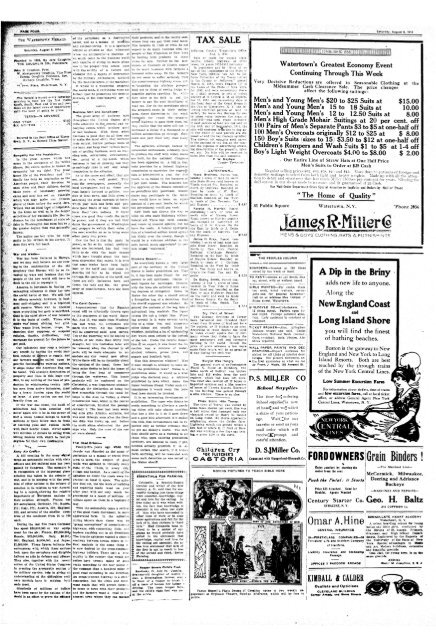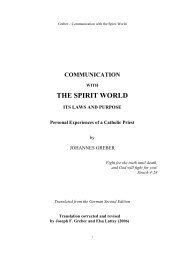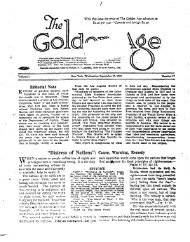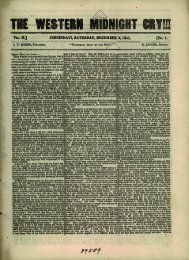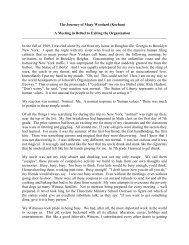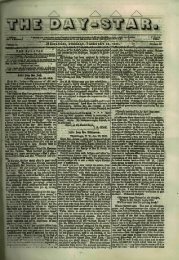1914 Photo Drama Newspaper - Watchtower Documents
1914 Photo Drama Newspaper - Watchtower Documents
1914 Photo Drama Newspaper - Watchtower Documents
You also want an ePaper? Increase the reach of your titles
YUMPU automatically turns print PDFs into web optimized ePapers that Google loves.
V^wsdSgiP*:.-<br />
VBE ^"ATEETOWN HERALD.<br />
Saturday, August 8, <strong>1914</strong><br />
rounded In 1886, By Jere Coughlin<br />
THE COUGHLIN CO:, Publishers<br />
#©kn B. Coughlin, Pres.<br />
W. Montgomery Coughlin, Vice Pres<br />
, Teresa Coughlin Ho 1 .brook, Sec.<br />
Richard Coughlin, Treas.<br />
*Q*'p»-k Place, Watertown, N. Y.<br />
The Herald is ls*aea every Saturday<br />
morning in time for the first mails<br />
North, South. East and West and contains<br />
all tfte latest news of importance<br />
until, the hour of going to press.<br />
ONE YEAR<br />
SiX IWV.THS<br />
TERMS—IN ADVANCE<br />
$1.50<br />
.75<br />
Entered hi the Post OfSce fc* "ft'ater<br />
town, N. Y., as Second Class Matter.<br />
Sympathy For The President—<br />
In the great sorrow which has<br />
come to the occupants of the White<br />
House, the entire nation is bowed m<br />
sympathy "for its chief. The ideal<br />
&ome life of the President and his<br />
family has been an inspiration to the<br />
American people; their devotion to<br />
each other and their children during<br />
these years of constantly growing<br />
cares and duty has set an example<br />
" Which well may make our citizens<br />
proud of them before the world. -Mrs.<br />
Wilson was an ideal tyjpe of helpmate,<br />
ill the home as well as in the larger<br />
activities of her husband's life. Her influence<br />
for the betterment of civic af-<br />
• fairs in Washington had been felt to a<br />
far greater degree than was generally<br />
known.<br />
The nation ean but -give its sympathy<br />
to Mr. Wilson in his sorrow. It<br />
does that with full heart.<br />
& ' "<br />
War and Waste-<br />
War has been declared in Europe,<br />
and we may well believe we are com-<br />
1 lag- to the confirmation of the old<br />
prophecy that Europe will be so defasted<br />
by wars and famines that the<br />
people of the new world will have to<br />
fiock to the old to repeople it.<br />
America, is fortunate in having no<br />
'entangling alliances to draw her into<br />
the awful havoc of war. We will feel<br />
its effects severely, however, in business<br />
and- shipping and in a depleted<br />
sold reserve. When war is decided<br />
apon everything but gold is sacrificed.<br />
•Id is the chief sinew of war because<br />
'ft is the basis of credit. Those who<br />
make war" hoard nothing but gold.<br />
" They waste lives, homes, crops, indnstries;<br />
they suppress or suspend<br />
religion, charity, civilization; they<br />
mortgage the present for the future to<br />
get gold.<br />
Our industries may reap a temporary<br />
benefit by haying the world mar-<br />
Sets outside of Ejiirope to supply, and<br />
our farmers majjggbe called upon to<br />
provide foodstufSpto warring nations,<br />
if ships under the American flag can;<br />
be found. The absolute destruction of<br />
property and lives in this huge con<br />
flict, to say nothing of the loss of production<br />
by withdrawing twenty mill-<br />
Jon men from active industries, must<br />
lay a heavy burden upon thevworld<br />
at large. A poor nation can not buy<br />
4 heavily from us.<br />
If "the war has come, the knell of<br />
militarism has been sounded and<br />
never again will it be in the power of<br />
half a dozen human beings to march<br />
millions of their fellow men in front<br />
~ of belching guns and redden earth<br />
With their hearts' blood. Never again<br />
. Will millions of dollars be wrung from<br />
toiling masses with which to fashion<br />
engines for their own destruction.<br />
r " >f i* —<br />
Army Air Craft-*<br />
A bill creating in the army «f«nal<br />
torps an aeronautic section with sixty<br />
officers and 200 enlisted men has been<br />
passed by Congress. The measure is<br />
m recognition of the important place<br />
aviation has taken in the science of<br />
war, and is in keeping with the progress<br />
of otfher nations in the science of<br />
aviation in ita relation to war. According<br />
to a report* showing the relative<br />
importance of European nations in<br />
their aviation strength, France has<br />
500 aeroplanes; Germany, 375; Russia,<br />
315; Italy, 275; Austria, 220; England,<br />
180, and several of the smaller countries<br />
of the continent from 75 to 100<br />
each.<br />
During the last five years Germany<br />
has spent $28,500,000 or war equipment<br />
for the air; Prance, $23^50,000^<br />
Russia, $112v500,OOO; Italy $8,500,-<br />
000; 'England, $4,000,000, and Japan,<br />
% 1,500,000. These figures indicate the<br />
seriousness with which these nations<br />
look upon the aeroplane and dirigible<br />
balloon as aids in defense and offense.<br />
They also, together with the recent<br />
action of the United 'States Congress<br />
in creating the areonautic section of<br />
Its military service, help in giving an<br />
understanding of the difficulties ordinary<br />
mortals have in making both<br />
ends meet<br />
(Hundreds of millions .of dollars<br />
fcave been spent by the nations of the<br />
World in an effort to prove the efficacy<br />
of the aeroplane as a destructive<br />
agent, and as a means of scoitj<br />
and reconnoitering. It is a spectacle<br />
almost as pitiable as that witnessed<br />
when the automobile—a machine ot<br />
so much value to the business world<br />
and capable of giving -so much pleasure<br />
to the people—was seized upon<br />
with the avidity of a vulture<br />
changed into a means of destruction<br />
by the military enthusiasts, assisted<br />
by the manufacturers of the machines<br />
it would be a wonderful progress<br />
the world made i: everything were not<br />
looked upon as promoting the destrnc-<br />
,tiveness. of the time-honored art o:<br />
war.<br />
Business Men and Conditions—<br />
The great army of business men<br />
throughout the United States gi-.e<br />
little attention to thejjeneral and underlying<br />
causes which produce good<br />
or bad business. With them when<br />
business is good they do ail they can<br />
to make the most oMt: they increase<br />
their output, borrow perhaps more at<br />
the bank and keep their various methods<br />
of getting business, such as tru\eling<br />
men. advertising, circularizing.<br />
etc., ^oing at a top notch. When<br />
business is bad or growing bad they<br />
grumblingly .take in sail and adapt,<br />
themselves to the situation.<br />
As to the cause and effect, they are<br />
not, as a rule, well posted. They<br />
read the newspapers, generally the<br />
local newspapers, and as these are<br />
read largely devoted to politics, outside<br />
of local news, and little given tu<br />
analyzing the great currents of force--.<br />
which play back and forth and produce<br />
good times or bad times they<br />
form their" own notions. If these<br />
times are good they credit-the party<br />
in power, and if they are bad thev<br />
damn the government at Washington<br />
and prepare to switch their votes at<br />
the next election so as to bring some<br />
other party into power.<br />
Now the fact is that the party in<br />
power, as far as its actual performances<br />
are concerned, has had very<br />
little to do with the basic causes<br />
which have brought about the busi<br />
ness depression that exists. It is true<br />
that some trades have been badly<br />
hurt by the tariff and that some industries<br />
bid fair to be wiped out<br />
through the operation of the tariff, but<br />
these are only instances here and<br />
there; the rank and file, the great<br />
army of manufactures, have not been<br />
injured.<br />
The Canal Opens—<br />
Announcement that the Panama<br />
canal will be informally thrown open<br />
to the commerce of the world Saturday,<br />
Aug 15. was made from Washington<br />
last week. No cermonies will<br />
mark this event. All the formality<br />
will be conserved until next spring.<br />
Use of the waterway will be limited to<br />
vessels of not more than thirty feet<br />
draught, but this limitation later will<br />
be removed when the channel in all<br />
parts will be made adequate to acmodate<br />
any size vessel HOW afloat.<br />
While there will be no formality about<br />
the opening of the canal, there has<br />
been some desire to hold the honor of<br />
being the first' boat of commerce<br />
through the waterway. This honor<br />
probably will be conferred on the<br />
^Christobal, a war department steamer,<br />
although the distinction of being the<br />
first steamship through the canal belongs<br />
to the Alex La Valley, a crane<br />
construction boat, which in the course<br />
of construction, finished the passage<br />
January 7. The boat had been working<br />
alon gthe Atlantic entrance, but<br />
was sent through soon after the Gamboa<br />
dike was blown up. and before<br />
the earth slides obstructed the passage<br />
way. Only the crew of the vessel<br />
were abroad.<br />
That Koad Dream—<br />
Twenty-five years ago when tlie<br />
bicycle was regarded as the acme of.<br />
perfection as a means of travel from<br />
town to town, the subject of good<br />
roads was agitated in virtually every<br />
state of the Union, in every city,<br />
village and hamlet. As a result of the<br />
agitation no doubt the roads were<br />
proved—at least in spots. The agitation<br />
died out, but the work of building<br />
and repairing roads went on year<br />
after year, with not very much improvement<br />
as a result of millions of<br />
dollars spent on them in a haphazard<br />
way.<br />
With the automobile came a revival<br />
of the good roads movement, in more<br />
aggravated form. In the agitatio<br />
during bicycle days there was n<br />
"grand conceptions" of ocean-to-oct^n<br />
highways, with connecting links a;i 1<br />
feeders reaching out in all directions.<br />
The bicycle agitators wanted a smoo i h<br />
roadway between towns, which in M.<br />
final analysis is the same thing a<br />
is now desired by the cross-continei:<br />
highway builders. There isn't a community<br />
in the country that would nor<br />
rather have twenty miles of gooi<br />
roads extending to the four points o<br />
the compass than a hundred miles of<br />
good road extending in one direction<br />
An ocean-to-ocean highway is a gran 1<br />
conception, but the cities and tov n<br />
want roads that will permit farmti.to<br />
come to town with their products<br />
their products, and to the county seat,<br />
where they can pay their road taxes.<br />
The farmers in Utah or Ohio do not<br />
expect to do much business with the<br />
people of San Francisco or New York<br />
by hauling farm products to those<br />
cities for sale. Neither do the merchants<br />
of Colorado or Illinois expect<br />
to do much business with farmers a<br />
housand miles away. So the farmers<br />
do not seem to suffer seriously from<br />
the ocean-to-ocean highway craze, notw^hstanding<br />
the glorious prospect<br />
held out to them of seeing happy a 'tomobile<br />
parties speeding by, w:A\r<br />
they labor in the field to get. the<br />
money to pay the next installmem o<br />
road tax. Nor do the merchants alone<br />
the proposed, route, in their enthusiasm,<br />
throw discretion to the wind.<br />
Certainly the >want the •. ocean-toocean<br />
highway to pass their door, but<br />
they realize that the sales will not -e<br />
increased a dollar if a thousand" or a<br />
million automobiles go through theii<br />
town and past their very door every<br />
day.<br />
The agitation, although backed by<br />
unbounded enthusiasm, evidently fails<br />
to produce the stuff with which road fa<br />
are built, for the national Congress,<br />
has been appealed to. A bill in that<br />
body provides for a federal highway<br />
commission to supervise the expenditure<br />
of $100..0(H.t.uou a year for' five<br />
years, to be raised by the issuance ot<br />
:) per cent, bonds. The measure has.<br />
the approval of the Senate committee<br />
on postoffices 'and postroads. Before<br />
states may participate in the funds<br />
they would have to issue an equal,<br />
amount of 4 per cent, bonds, for which<br />
the government would pay cash.<br />
New York has shown the way to<br />
build its own state highways without<br />
federal aid. There has been scandal<br />
and rumor of scandal aplenty, but we<br />
ha\e the roads. A federal appropria-,<br />
tion of a hundred million would sprea I<br />
but thinly over the county, though it<br />
would be a welcome addition to th?<br />
pork barrel, much appreciate^ by certain<br />
inland, "statesmen<br />
Drinkers Beware! —<br />
As everybody knows, a very large<br />
part of the territory of the United<br />
States is under prohibition law. Thaiis,<br />
it has been made illegal for any<br />
person to sell spirituous, vinous ite each parce.<br />
is the amount of tax due on the sam.<br />
and the expense of advertising obtaining<br />
descriptions of the property, inter<br />
est, etc. No bids will be received in •<br />
sums less than the said amounts.<br />
F W. Mayhew<br />
Counts Tr°3s lrer<br />
--.VATERTOWN—<br />
Ward Brothers, Parcel containing<br />
3 acre>> of land on south<br />
side State Street road known as :<br />
Wards Gravel Pit, Bounded on j<br />
North by Highway. Bounded on j<br />
East by lands of \Y. Hart. j<br />
Bounded on south by land? of ]<br />
Sheldon. Bounded on the West<br />
by lands of Geo. Newman. Tax j<br />
and Expense $ 9.87 !<br />
Fayette N. Herrick. Parcel 1<br />
containing 1 acre of land on !<br />
north side o: Massey Street :<br />
Road, known as Herrick poperty |<br />
and hounded on northwest by j<br />
lands of 13. YV. Graves. On the j<br />
the East by lands of J. Netto. i<br />
On the south by highway. Tax j<br />
and Expense $17.72 j<br />
James H. Gray. Parcel con- !<br />
taining :) acres of land near east j<br />
side Hunt Street. Bounded on<br />
North by New York Central |<br />
Railroad (Carthage Branch). \<br />
Bounded on the East by lands<br />
of Staples Estate. Bounded on<br />
South by lands of J. Gotham.<br />
Bounded on the West by lands<br />
of L. Van Rupp and known as<br />
Gray's Ice Pond. Tax and Expense<br />
$ 5.76<br />
De Esting Smith. Parce! containing<br />
i2 and '_• acres of land,<br />
located on West Side of Rome<br />
State Road and bounded on the<br />
East by said Highway. Bounded<br />
on the north and west by lands<br />
of Dewey Estate. On the South<br />
by lands of .John Smith. Tax<br />
and Expense $ 7.11<br />
Big Yield of Wheat.<br />
The Norman Brothers of Torrey<br />
have harvested and threshed their<br />
wheat from 20 acres of land and ha\ e<br />
700 bushels, or 35 bushes to au acre.<br />
According to those figures the yield<br />
in l'ates county equals that of Germany<br />
where they claim to have the<br />
most productive soil and intensive<br />
farming in the world. Should the<br />
price of grain advance a few more<br />
cents their return will be as great'as<br />
it was during the civil war.<br />
Burglar Was Hungry.<br />
The general store of ex-Postmaster j<br />
Floyd N. Stone at Richburg, two j<br />
miles north of Bolivar, was broken<br />
into and $15 stolen from the cash j<br />
register, which had been left open !<br />
The thief also carried off 12 boxes oi \<br />
imported sardines and a like numbpi<br />
of boxes of Uneeda biscuts. Entrance<br />
to the building was gained through<br />
a side window. There is no clue.<br />
Freak Storm Hits Torrey.<br />
The town of Torrey was visited by<br />
some freak storms last week. One w;is<br />
a hail storm that damaged only one<br />
vineyard owned by Harry W. Geldr<br />
on Long Point, the stornv apparently<br />
originating above the Gelder farm.<br />
Lightning struck the ground within a<br />
few feet of w-here E. C, Xutt of Dresden<br />
was working a few days ago tear<br />
ing a great hole in the earth.<br />
Children Cry<br />
*0R FLETCHER'S<br />
CASTO R I A<br />
Watertown's Greatest Economy Event<br />
Continuing Through This Week<br />
Saturday, August 8, <strong>1914</strong><br />
Very Decisive Reductions are offered in Seasonable Clothing at the<br />
Midsummer Cash Clearance Sale. The price changes<br />
affect the following suitings :<br />
Men's and Young Men's $20 to $25 Suits at $15.00<br />
Men's and Young Men's 15 to 18 Suits at 10.00<br />
Men's and Young Men's 12 to 12.50 Suits at 8.00<br />
Men's High Grade Mohair Suitings at 20 per cent, off<br />
100 Pairs of Men's Separate Pants $3 to $5 at one-haif off<br />
100 Men's Overcoats originally $12 to $25 at $ 8.00<br />
150 Boy's Suits (sizes to 15; $3.50 to $12 at one-half off<br />
Children's Rompers and Wash Suits $1 to $5 at 1-4 off<br />
Boy's Light Weight Overcoats $4.00 to $8.00 $ 2.00<br />
. Our Entire Line of Straw Hats at One Half Price<br />
Men's Suits to Order at $25 Cash<br />
R.-uuIar ^.-Hiiif; yvk-


